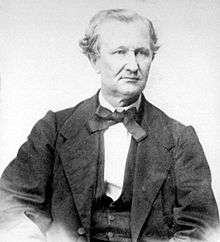Meiggs Wharf


Meiggs' Wharf (also known as Meigs Wharf and Meiggs' Pier) was a L-shaped wooden pier extending between 1600 and 2000 feet from the northern San Francisco shoreline, an exceptional distance for its time. It was built to attract the lumber shipping trade by transplanted San Franciscan Henry Meiggs as part of his real estate development plans for what would become the North Beach area of San Francisco. Though it bankrupted him in the process, it would become a major part of North Beach and San Francisco society life.[1]
The Pier
The pier was exceptionally long for its day, regarded by many as built in the wrong place: currents and tides ran strong at the northern tip of San Francisco off North Beach, and ships at dock were not protected by a breakwater as they were further inside San Francisco Bay at the Embarcadero. Most ships preferred the quieter waters and sailed on to safer berths there.

Anchored between north-south Mason and Powell Streets and east-west Francisco Street, Meiggs' Wharf stretched at least 1600' and possibly 2000' into the bay. This is some 200 feet further out than today's Fishermen's Wharf.
Financially, Meiggs' pier and its associated real estate developments ruined him. The 'Father of North Beach,' tried to cover his shortfalls with illicitly obtained warrants against the San Francisco Street Fund. Before his fraud was discovered he fled on October 6, 1854 on his brig America with his family and brother, John Meiggs, the newly elected City Controller. He landed in Chile, where after losing $8,000 in stake money and pawning his pocket watch he would make another large fortune building Chilian and Peruvian railroads.
After Meiggs' flight in 1854 the pier was left without an owner. Local merchant Abraham Warner opened the Cobweb Palace saloon and eatery in 1856 at the foot of the wharf. Stuffed with curios, it proved successful and served as an early social gathering spot for the entire city regardless of class. The pier became the southern terminus for the ferry to Marin County.
Over time, North Beach expanded and became a thriving part of San Francisco, bearing out Meiggs' vision.
References
External links
- http://sf.curbed.com/archives/2014/10/21/the_fishermans_wharf_precursor_built_by_a_victorian_hustler.php
- http://www.maritimeheritage.org/news/wharves.html